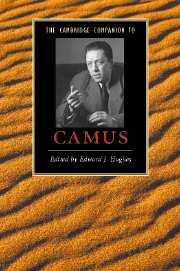Book contents
- Frontmatter
- Introduction
- PART I: BIOGRAPHY AND INFLUENCES
- PART II: THEMES, PREOCCUPATIONS AND GENRES
- 4 Rethinking the Absurd: Le Mythe de Sisyph
- 5 Camus and the theatre
- 6 Camus the journalist
- 7 Camus and social justice
- 8 Violence and ethics in Camus
- 9 Camus and Sartre: the great quarrel
- 10 Portraits of women, visions of Algeria
- PART III: TEXTS AND CONTEXTS
- Postface
- Guide to Further reading
- Index
- Series List
9 - Camus and Sartre: the great quarrel
from PART II: - THEMES, PREOCCUPATIONS AND GENRES
Published online by Cambridge University Press: 28 September 2007
- Frontmatter
- Introduction
- PART I: BIOGRAPHY AND INFLUENCES
- PART II: THEMES, PREOCCUPATIONS AND GENRES
- 4 Rethinking the Absurd: Le Mythe de Sisyph
- 5 Camus and the theatre
- 6 Camus the journalist
- 7 Camus and social justice
- 8 Violence and ethics in Camus
- 9 Camus and Sartre: the great quarrel
- 10 Portraits of women, visions of Algeria
- PART III: TEXTS AND CONTEXTS
- Postface
- Guide to Further reading
- Index
- Series List
Summary
When, during a speech on the future of Europe delivered in Brussels in February 2005, President George Bush cited a sentence from La Chute, it is unlikely that he intended to stir up memories of the infamous quarrel between Camus and Sartre that had occurred over fifty years before. However, by evoking Clamence's understanding of freedom as 'a long-distance race' (F, 97) ('une course de fond' (TRN, 1544)), Bush unwittingly cited from Camus's clear and bitter parody of Sartre in which the protagonist presents himself as a 'partisan éclairé de la servitude' ('an enlightened advocate of slavery'), before claiming that he used to spread the word 'freedom' on his toast at breakfast (TRN, 1543; F, 97). Bush's neo-conservative appropriation of Camus as a critic of terrorist violence accordingly backfired, for the author aims to indict those - Sartre and his colleagues at Les Temps modernes included - who, he claims, babble on about freedom whilst at the same time exploiting its rhetoric as a convenient smokescreen for their own oppressive purposes. The anecdote is telling for a number of reasons: not only does it suggest the enduring, resonant legacies of the Camus-Sartre dispute; it also serves as a warning to those who ignore the ambiguities of that dispute, and attempt instead to present its principal players in reductively ideological terms.
Despite the persistent presence of Camus and Sartre in French culture, it is difficult five decades on to imagine the public interest generated by the philosophical, literary and ideological debates underpinning their very personal quarrel. The 1952 exchange of articles nevertheless achieved the status of a national dispute, continuing a Gallic tradition of high profile intellectual feuds. There was wide press coverage of the acrimonious exchanges, and Francis Jeanson, in the initial article that had effectively sparked the controversy, stated accurately that the disagreement encapsulated some of the most urgent issues of his time.
- Type
- Chapter
- Information
- The Cambridge Companion to Camus , pp. 118 - 130Publisher: Cambridge University PressPrint publication year: 2007
- 2
- Cited by

